There are so many new books coming our way this spring. A lot of them are focused on housing. Several have been compared to Evicted, for better or worse. A few draw lessons from individual cities such as Boston, Chicago, Detroit, New York and Tulsa. Some are hotly anticipated, such as Ezra Klein and Derek Thompson’s joint effort, Abundance. If this first dozen of 2025 is any indication, it’s going to be crowded on my nightstand this year.
All these books and more are featured in The New Urban Order bookshop!
Building the Metropolis: Architecture, Construction, and Labor in New York City, 1880-1935
by Alexander Wood (Jan 10, 2025)
Between the 1880s and the 1930s, New York City experienced explosive growth as nearly a million buildings, dozens of bridges and tunnels, hundreds of miles of subway lines, and thousands of miles of streets were erected to meet the needs of an ever-swelling population. Building the Metropolis offers a revelatory look at this era of urban development by asking, “Who built New York, and how?” Focusing on the work of architects, builders and construction workers, Alexander Wood chronicles the physical process of the city’s rapid expansion.
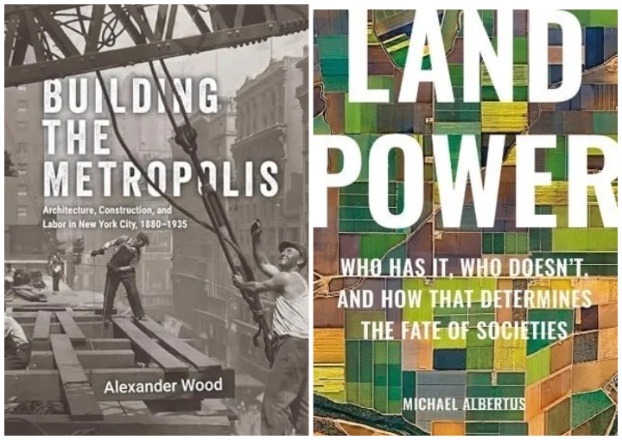
Land Power: Who Has It, Who Doesn’t, and How That Determines the Fate of Societies
by Michael Albertus (January 14, 2025)
For millennia, land has been a symbol of wealth and privilege. But the true power of land ownership is even greater than we might think. In Land Power, political scientist Michael Albertus shows that who owns the land determines whether a society will be equal or unequal, whether it will develop or decline, and whether it will safeguard or sacrifice its environment. Drawing on a career’s worth of original research and on-the-ground fieldwork, Albertus shows that choices about who owns the land have locked in poverty, sexism, racism and climate crisis — and that what we do with the land today can change our collective fate.
The Pointillistic City How Microspatial Inequities Affect Well-Being in Our Communities, and What We Can Do about It
by Daniel T. O’Brien (January 21, 2025)
The Pointillistic City explores the multilayer geography of our daily lives — specifically, how we simultaneously live at the scales of addresses, streets, and neighborhoods and how each can be relevant for our well-being. Not unlike the way in which we look at a pointillistic painting, which depicts a full scene through the detailed organization of multiple objects, Daniel T. O’Brien considers the three scales together and the comprehensive understanding of the city they offer. This book illustrates the pointillistic perspective on cities with two in-depth case studies — one on crime, the other on environmental justice — in Boston.
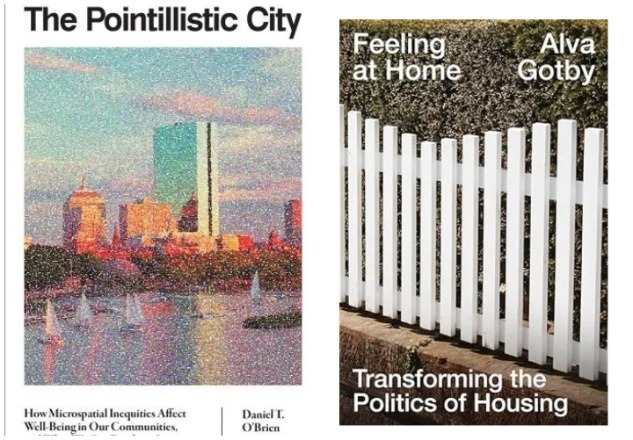
Feeling at Home: Transforming the Politics of Housing
by Alva Gotby (January 21, 2025)
Feeling at Home grapples with the practical and emotional questions of housing — domestic labor, privacy, security, ownership and health. Is it possible to imagine success without home ownership? Alva Gotby makes clear that solving the housing crisis is about much more than housing stock.
Plundered: How Racist Policies Undermine Black Homeownership in America
by Bernadette Atuahene (January 28, 2025)
When Professor Bernadette Atuahene moved to Detroit, she planned to study the city’s squatting phenomenon. What she accidentally found was too urgent to ignore. Her neighbors, many of whom had owned their homes for decades, were losing them to property tax foreclosure, leaving once bustling Black neighborhoods blighted with vacant homes. Through years of dogged investigation and research, Atuahene uncovered a system of predatory governance, where public officials raise public dollars through laws and processes that produce or sustain racial inequity.
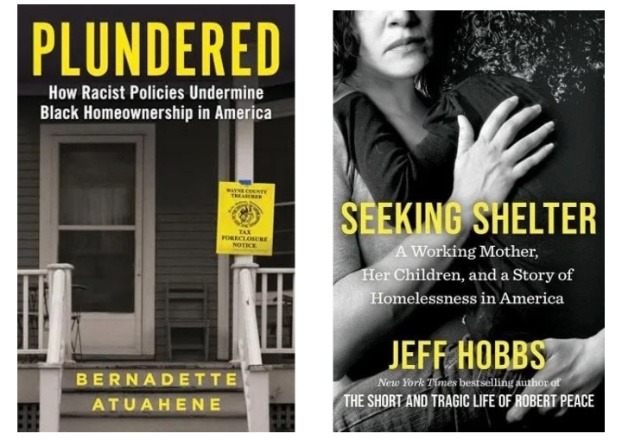
Seeking Shelter A Working Mother, Her Children, and a Story of Homelessness in America
by Jeff Hobbs (February 4, 2025)
In 2018, poverty and domestic violence cast Evelyn and her children into the urban wilderness of Los Angeles, where she avoided the family crisis network that offered no clear pathway for her children to remain together and in a decent school. Eventually Evelyn encountered Wendi Gaines, a recently trained social worker who decades earlier survived her own abusive marriage and housing crisis. The book follows how Evelyn became one of Wendi’s first clients, and the relationship transformed them both.
Homes for Living: The Fight for Social Housing and a New American Commons
by Jonathan Tarleton (February 11, 2025)
In Homes for Living, urban planner and oral historian Jonathan Tarleton introduces readers to two social housing co-ops in Brooklyn and Manhattan. Longtime residents of St. James Towers and Southbridge Towers lock horns over whether to maintain the rules that have kept their homes affordable for decades or to cash out at great personal profit, thereby denying future generations the same opportunity to build thriving communities rooted in mutual care. Tarleton explores housing as a public good, movements for tenant rights and Indigenous sovereignty, and questions of race and class to lay bare competing visions of what ownership means, what homes are for, and what neighbors owe each other.
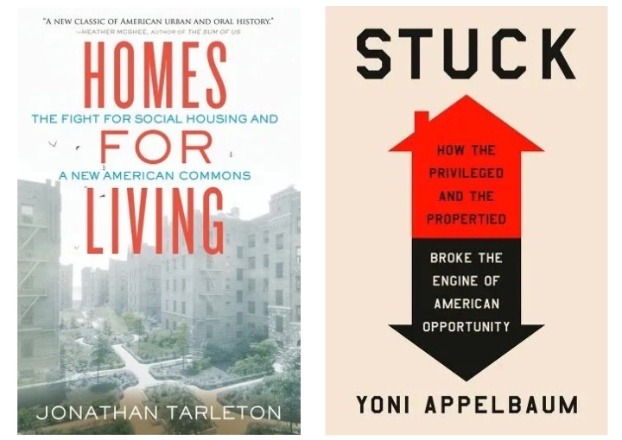
Stuck: How the Privileged and the Propertied Broke the Engine of American Opportunity
by Yoni Applebaum (February 25, 2025)
We take it for granted that good neighborhoods — with good schools and good housing — are only accessible to the wealthy. But in America, this wasn’t always the case. Americans moved to new places with unprecedented frequency, and, for 200 years, that remarkable mobility was the linchpin of American economic and social opportunity.
Yoni Appelbaum, historian and journalist for The Atlantic, shows us that this idea has been under attack since the first zoning laws, has raised housing prices, deepened political divides, emboldened bigots, and trapped generations of people in poverty. Appelbaum shows us that these problems have a common explanation: People can’t move as readily as they used to. They are, in a word, stuck.
Reinventing the Heartland: How One City’s Inclusive Approach to Innovation and Growth Can Revive the American Dream
by Nicholas Lalla (March 4, 2025)
Every city in America wants to become a tech hub, yet so few succeed — and that’s the problem. Tech jobs, venture capital, and R&D are concentrated in a handful of big coastal cities, while the broad middle of the country is left out. But to thrive in the 21st century, cities must create innovation economies of their own and grow in more inclusive ways. In January 2020, Nicholas Lalla founded Tulsa Innovation Labs to help Tulsa, Oklahoma transition from its oil and gas legacy to tech. Lalla’s organization would go on to build the first tech-led economic development strategy in northeast Oklahoma’s history, raise over $200 million, and create thousands of tech jobs. This success catalyzed a massive, citywide endeavor — the first time in American history a city has dedicated itself in such a concerted way to becoming a player in the innovation economy.
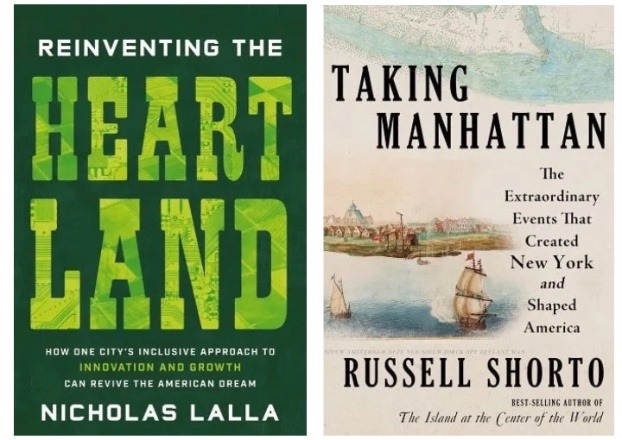
Taking Manhattan: The Extraordinary Events That Created New York and Shaped America
by Russell Shorto – March 4, 2025
Taking Manhattan tells the riveting story of the birth of New York City as a center of capitalism and pluralism, a foundation from which America would rise. It also shows how the paradox of New York’s origins — boundless opportunity coupled with subjugation and displacement — reflects America’s promise and failure to this day. Russell Shorto has once again mined archival sources to offer a vibrant tale and a fresh and trenchant argument about American beginnings.
Abundance
by Ezra Klein and Derek Thompson (March 18, 2025)
To trace the global history of the 21st century so far is to trace a history of growing unaffordability and shortage. After years of refusing to build sufficient housing, the entire country has a national housing crisis. After years of slashing immigration, we don’t have enough workers. After decades of offshoring manufacturing, we have a shortage of chips for cars and computers. Despite decades of being warned about the consequences of climate change, we haven’t built anything close to the clean energy infrastructure we need. The crisis that’s clicking into focus now has been building for decades — because we haven’t been building enough. Klein and Thompson trace the political, economic and cultural barriers to progress and how we can adopt a mindset directed toward abundance, and not scarcity, to overcome them.
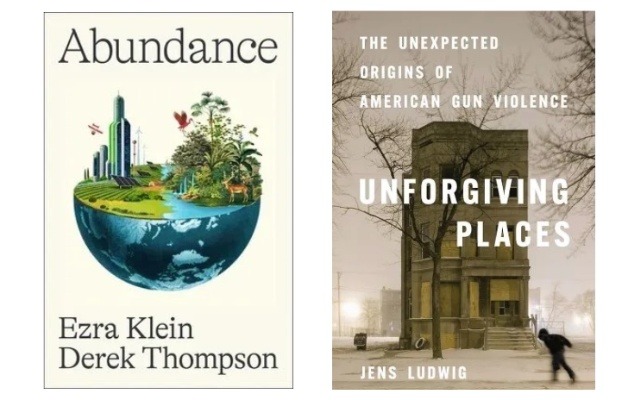
Unforgiving Places: The Unexpected Origins of American Gun Violence
by Jens Ludwig (April 21, 2025)
In 2007, economist Jens Ludwig moved to the South Side of Chicago to research two big questions: Why does gun violence happen, and is there anything we can do about it? Almost two decades later, the answers aren’t what he expected. Disproving the popular narrative that shootings are the calculated acts of malicious or desperate people, Ludwig shows how most shootings actually grow out of a more fleeting source: interpersonal conflict, especially arguments.
By examining why some arguments turn tragic while others don’t, Ludwig shows gun violence to be more circumstantial — and more solvable — than our traditional approaches lead us to believe. As Ludwig shows, progress on gun violence doesn’t require America to solve every other social problem first; it only requires that we find ways to intervene in the places and the 10-minute windows where human behaviors predictably go haywire.
Diana Lind is a writer and urban policy specialist. This article was also published as part of her Substack newsletter, The New Urban Order. Sign up for the newsletter here.
![]() MORE FROM THE NEW URBAN ORDER
MORE FROM THE NEW URBAN ORDER



